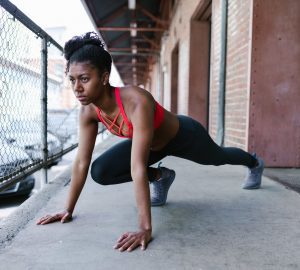Movement is perhaps the most powerful stimulus to live longer and build and strengthen our mitochondria. Mitochondria are the energy factories of our bodies and brains. Mitochondria break down the food that we eat to create ATP. Remember that ATP are the energy of our cells.
Consistent physical activity sparks the creation of new mitochondria, increases the size of our mitochondria, increases the density of mitochondrial membranes where energy production takes place, and increases the number of enzymes in our mitochondria that break down the food that we eat to help create more ATP.
What I find most encouraging about our developing understanding about how movement builds and strengthens our mitochondria is that we don’t need to do much to get these benefits. Dr. Amanda Paluch and colleagues from the Department of Kinesiology, University of Massachusetts followed over 2,000 adults for 10 years and found that taking more than 7,000 steps per day was associated with 50–70% lower risk of mortality. Although you may have heard that 10,000 steps is a good goal, current science is showing that we don’t need to get to that threshold to reap the rewards of moving more.
Exercise is a keystone habit that triggers widespread change. Charles Duhigg
It also does not appear to matter what type of activity you do. Almost any leisure-type activity helps! Data from the decades-long (25 years and counting!) Copenhagen City Heart Study showed that people who participated in 2.5 to 4.5 hours per week of tennis, badminton, soccer, handball, cycling, swimming, jogging, calisthenics, health club activities, weightlifting, and other sports all had the lowest risk for all-cause mortality. This was after adjusting for potential confounders among subgroups of age, sex, education, smoking, alcohol intake, and body mass index.
The key takeaway? Two and a half hours per week is only about than 20 minutes per day!
For many of us, our aim is to live longer, and a healthier life is a goal many people aspire to achieve. While genetics plays a significant role in longevity, there are several lifestyle choices and habits that can contribute to a longer and healthier life. Here are some tips to help you on your journey:
Eat a Balanced Diet:
- Focus on a variety of fruits, vegetables, whole grains, lean proteins, and healthy fats.
- Limit your intake of processed foods, sugary beverages, and excessive amounts of red meat.
Stay Hydrated:
- Drink plenty of water throughout the day to stay properly hydrated.
Exercise Regularly:
- Aim for at least 150 minutes of moderate-intensity aerobic activity or 75 minutes of vigorous-intensity aerobic activity per week.
- Include strength training exercises at least two days a week to maintain muscle mass.
Get Adequate Sleep:
- Aim for 7-9 hours of quality sleep per night to allow your body to rest and recover.
Manage Stress:
- Practice stress-reduction techniques such as meditation, deep breathing, yoga, or mindfulness to lower stress levels to live longer.
Stay Socially Active:
- Maintain strong social connections and engage in activities with friends and loved ones to support mental and emotional well-being.
Limit Alcohol Consumption:
- If you consume alcohol, do so in moderation. This generally means up to one drink per day for women and up to two drinks per day for men.
Avoid Smoking and Substance Abuse:
- Don’t smoke, and avoid exposure to secondhand smoke. Avoid illicit drug use and limit prescription drug use to what is medically necessary.
Regular Check-ups:
- Visit your healthcare provider for regular check-ups and screenings to detect and manage health issues early.
Maintain a Healthy Weight:
- Aim for a healthy body mass index (BMI) by following a balanced diet and staying physically active.
Cognitive Engagement:
- Keep your mind active by engaging in activities that challenge your brain, such as puzzles, reading, learning a new skill, or pursuing hobbies.
Sun Protection:
- Protect your skin from excessive sun exposure by wearing sunscreen and protective clothing to reduce the risk of skin cancer.
Stay Vaccinated:
- Stay up-to-date with vaccinations to protect against preventable diseases.
Positive Outlook:
- Maintain a positive attitude and try to find joy and fulfillment in life. A positive mindset can have a significant impact on overall well-being.
Give Back:
- Engage in volunteer work or support charitable causes. Helping others can provide a sense of purpose and fulfillment.
Remember that making small, sustainable changes to your lifestyle over time can have a significant impact on your long-term health and longevity to live longer. It’s also important to consult with a healthcare professional before making major changes to your diet or exercise routine, especially if you have underlying health conditions or concerns.
This month we would love for you to consider how to move for 20 or more minutes most days. Remember any type of activity counts!








